 Petzlover
PetzloverAlano Espanol is originated from Spain but Pugnaces Britanniae is originated from United Kingdom. Alano Espanol may grow 11 cm / 4 inches shorter than Pugnaces Britanniae. Alano Espanol may weigh 70 kg / 154 pounds lesser than Pugnaces Britanniae. Both Alano Espanol and Pugnaces Britanniae has almost same life span. Alano Espanol may have less litter size than Pugnaces Britanniae. Both Alano Espanol and Pugnaces Britanniae requires Low Maintenance.
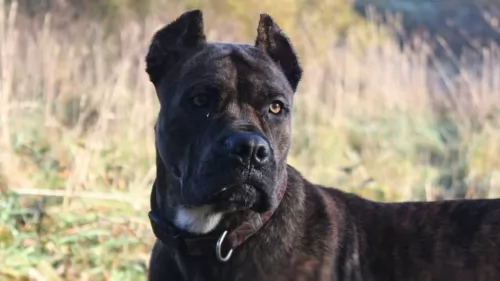 Alano Espanol is a very old breed and first data originate back in the 5th century. Alano has been used as dogs for war and dogs that traveled with explorers. After some, time Alano Espanol becoming more and more popular for bullfights and wild boar hunting. Nowadays, Alano Espanol is still not recognized worldwide, but it seems like this breed is getting more and more popular. They are excellent hunters and amazing working dogs.
Alano Espanol is a very old breed and first data originate back in the 5th century. Alano has been used as dogs for war and dogs that traveled with explorers. After some, time Alano Espanol becoming more and more popular for bullfights and wild boar hunting. Nowadays, Alano Espanol is still not recognized worldwide, but it seems like this breed is getting more and more popular. They are excellent hunters and amazing working dogs.
Pugnaces Britanniae is a dog which is now extinct. There isn't certainty surrounding the origins of the dog but it is thought they descended from dogs brought to Britain way back in the 6th century BC already.
These are ancient dogs, and when you do research you find references dating back to centuries ago. In fact when you read of the Roman conquest of Britain you read of huge dogs, which the Romans referred to as Pugnaces Britanniae.
It is believed that the English Mastiff descended from the ancient Alaunt and Pugnaces Britanniae and that the dog was used as a war dog.
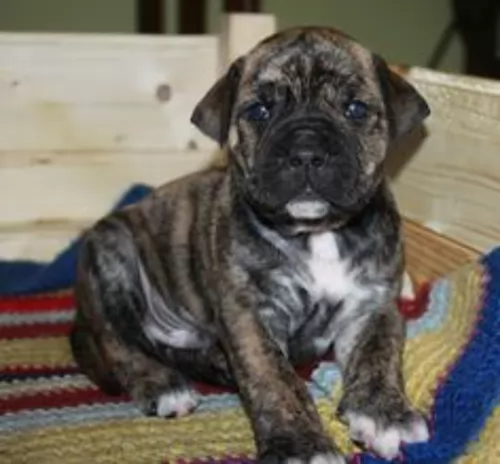 On average, Alano Espanol approximately weights 34-40kg, while their average height is 56-64cm. Females are slightly smaller than male dogs.
On average, Alano Espanol approximately weights 34-40kg, while their average height is 56-64cm. Females are slightly smaller than male dogs.
A lifespan of Alano Espanol variates but on average it is 11 to 14 years.
Litter Size is 4-8 puppies, but it depends on every dog.
Other Names for Alano Espanol are Spanish Bulldog and Spanish Alano.
The Pugnaces Britanniae was a huge dog standing at roughly 67 to 75cm and weighing 52 to 110kg.
He was a heavily built dog, a Mastiff type dog that had a large head, broad muzzle with fairly loose skin around the mouth, brown eyes, a broad back and rump, muscular legs and floppy ears with a long tail. In fact the Mastiff, thought to have descended from the ancient Alaunt and Pugnaces Britanniae, gives you an idea of what the dog looked like. He no doubt has a short, smooth coat available in fawn, tan or brindle and with the black mask.
The Pugnaces Britannia was a naturally aggressive dog so it is to be expected that he wouldn’t automatically have been a good family dog, possibly being aggressive around children and other dogs. They were intelligent and were no doubt taught some simple commands.
They were also very territorial dogs, wanting to instinctively chase and attack unknown people and animals. They were strong minded, confident, loyal ad loving dogs towards their owners, being protective of them, wanting to please them.
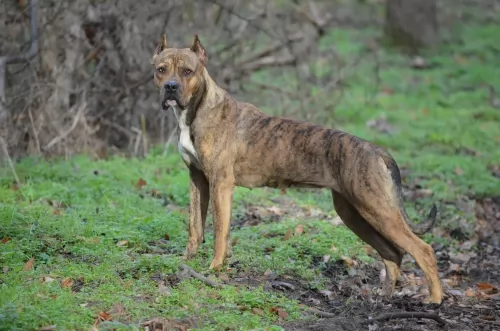 Alano Espanol is an extra-large breed but they are very well balanced breed and they tend to be very reliable and calm. They are not very comfortable living in the small apartments. They are better in houses. They are also very good with kids. Alano Espanol needs a lot of daily exercise with a minimum of 3 walks per day. Even though people used them for dogfights and bullfights through the history. They are not recommended for the first time owners because they are strong-willed dogs who tend to be leaders in the pack. Strong will and constant training are very important for them. They are very dominant breed and have Alpha character. Socialization is also very important for Alano Espanol because they are very powerful and they can easily hurt other animals. They will listen the master but it is important that they play and socialize with other animals from very young age. Alano Espanol can be a very good with other animals even in the same household, but only with proper socialization. If the dogs are the same sex, they tend to show dominance. Basically, they can be amazing pets, but it is important to train them properly.
Alano Espanol is an extra-large breed but they are very well balanced breed and they tend to be very reliable and calm. They are not very comfortable living in the small apartments. They are better in houses. They are also very good with kids. Alano Espanol needs a lot of daily exercise with a minimum of 3 walks per day. Even though people used them for dogfights and bullfights through the history. They are not recommended for the first time owners because they are strong-willed dogs who tend to be leaders in the pack. Strong will and constant training are very important for them. They are very dominant breed and have Alpha character. Socialization is also very important for Alano Espanol because they are very powerful and they can easily hurt other animals. They will listen the master but it is important that they play and socialize with other animals from very young age. Alano Espanol can be a very good with other animals even in the same household, but only with proper socialization. If the dogs are the same sex, they tend to show dominance. Basically, they can be amazing pets, but it is important to train them properly.
The Pugnaces Britanniae may well have been a large dog and quite imposing to look at but he was in all likelihood a good-natured pet who got on well with his family members, being loyal and loving if brought up correctly.
Long ago dog training and socialization didn’t exist but a large dog like this would have to be socialized and trained to become obedient and an amicable all-rounder.
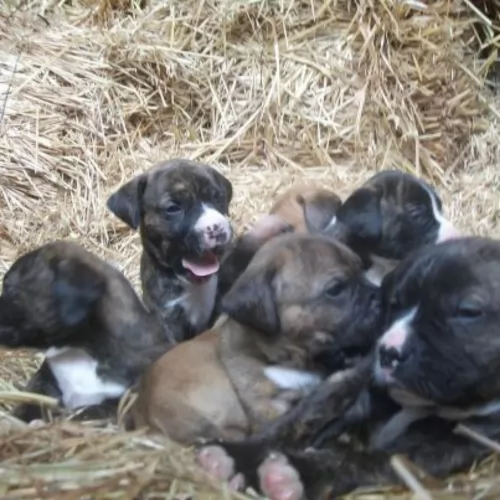 Alano Espanol is a very strong and healthy breed. They do not have any major health issues. Aldo, as with every large breed you should be careful of dogs genetic because they might have dysplasia. However, they are very healthy dogs with no health issues so your dog will live happy and healthy life with a proper care and occasional vet examination.
Alano Espanol is a very strong and healthy breed. They do not have any major health issues. Aldo, as with every large breed you should be careful of dogs genetic because they might have dysplasia. However, they are very healthy dogs with no health issues so your dog will live happy and healthy life with a proper care and occasional vet examination.
The Pugnaces Britanniae could live to 10, 11 or 12 years of age with good care. Large Mastiff type dogs like this would have had to watch out for common canine diseases such as hip dysplasia, cancer and bloat.
In those days, no screening tests were available for health problems like this. Gastric dilatation volvulus or bloat is a common health issue with large, deep chested dogs where the stomach fills with gas and the stomach twists. Its a life threatening disease.
Canine heart disease is another serious health issue with these mastiff type dogs. Early stages with heart disease show there may well be no symptoms at all. However, as the heart disease progresses towards congestive heart failure, the dog will have symptoms such as fatigue, difficulty with breathing, weight loss, a distended abdomen and coughing.
A dog with symptoms like this would have to see a vet immediately.
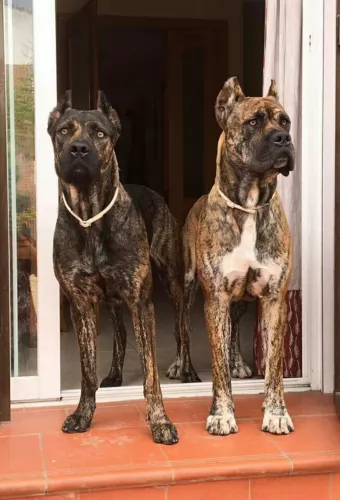 Feeding habits of any dog depend on daily activity and size. Alano Espanol should eat approximately 4-5 cups of high-quality food divided into two meals. You can also add some vegetables, fruit, oil or basically anything that you see your dog enjoy eating.
Feeding habits of any dog depend on daily activity and size. Alano Espanol should eat approximately 4-5 cups of high-quality food divided into two meals. You can also add some vegetables, fruit, oil or basically anything that you see your dog enjoy eating.
Alano Espanol puppies need more food divided into 3-5 meals per day. It is very important that puppy has all the necessary vitamins and minerals to develop into a big and healthy adult.
Alano Espanol is a very easy breed to groom. They have short hair with no undercoat, so minimal grooming is all that it takes. Alano does not drool, so it is not very hard to keep them clean. They will need occasional baths, but only when they are dirty because if you bath your dog too much, the skin could dry and start to itch.
The diets of ancient dogs were different to what they are today, as in those days there were no commercially manufactured dog foods. Dog owners in all likelihood tossed scraps to them which included starch.
Today a large dog such as the extinct Pugnaces Britannia would have no doubt been fed a high quality kibble from a leading brand and packed with minerals and vitamins specially formulated for a large dog breed.
Homemade food is also important, but not any kind of food – it has to be food which doesn’t upset the dog’s digestive system. Simple but nutritious food such as boiled chicken, brown rice or pasta, sweet potatoes, carrots and spinach is ideal for a dog, and when it is chopped up can be added twice a week to the dry kibble for a tasty, healthy treat.
Raw meat added in occasionally is also hugely beneficial. No dog should ever be without fresh, cool water constantly available.
As a short haired dog, the Pugnaces Britanniae would have required a brushing twice a week to rid the dog of loose hairs. Maybe in those days they didn’t check their dogs over to see that all was well, but today you would need to check the inside of the ears. If the insides were red, it could be a sign of an ear infection brought on by dampness, excess wax and dirt.
The eyes would need to be checked for discharge and the teeth checked a well. One rotten tooth can cause a lot of havoc. The nails of the dog would have had to be checked and clipped as well.
As a war dog, the Pugnaces Britanniae would have been fit. He is a big dog and while they require exercise such as walks and hide-and-seek type of games, he isn’t the kind of dog that would go running with you on a jog, as large, heavy dogs can overheat easily.